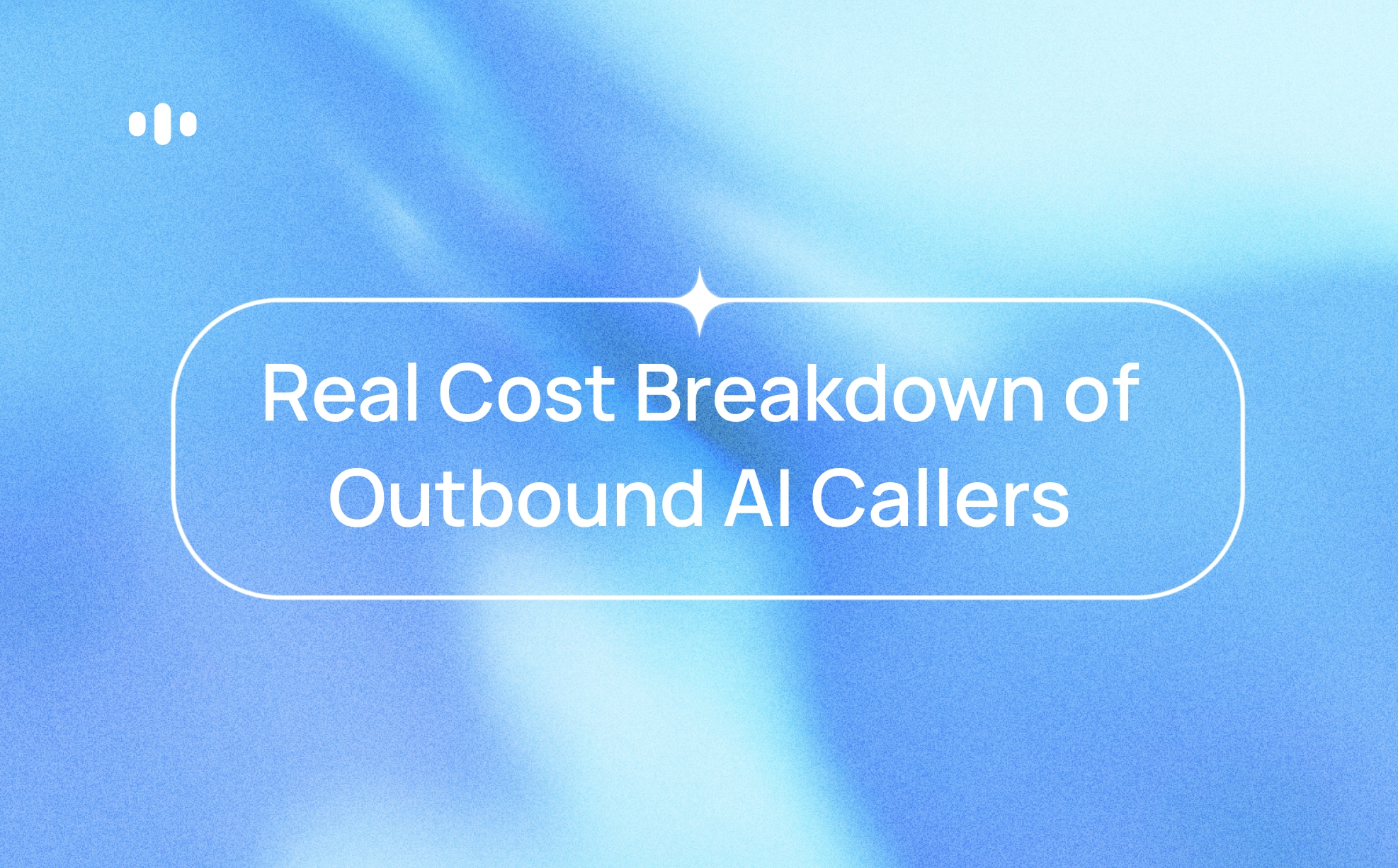Cost Model Deep-Dive: Running 10,000 Outbound AI Phone Calls per Day in the US (Retell vs Twilio vs Dialpad)


Finance leaders evaluating AI voice automation need hard numbers, not marketing fluff. When you're planning to deploy 10,000 outbound calls daily—whether for lead qualification, appointment setting, or customer outreach—every minute of talk time translates directly to operational costs that can make or break your ROI projections.
This deep-dive models the real-world economics of running high-volume AI phone campaigns across three distinct approaches: Retell AI's integrated platform, Twilio's developer-focused infrastructure, and Dialpad's enterprise communications suite. We'll break down minute-level costs across voice engines, large language models (LLMs), and telephony infrastructure at three critical average handle time (AHT) scenarios: 3, 5, and 7 minutes per call. (Retell AI)
Before diving into cost models, it's worth establishing why enterprises are rapidly adopting AI voice agents. Despite the rise of chat and social channels, 61% of consumers still prefer phone support for urgent problems. (Retell AI) McKinsey estimates that generative AI customer service deployments can slash service costs by 30-45% on average, while organizations have realized a 331% ROI over three years by deploying Google Contact Center AI. (Retell AI)
The numbers get even more compelling when you examine real-world implementations. A regional insurer replaced 50% of after-hours staff with Retell AI and saved $480K annually while improving first-call resolution, while a logistics firm cut average handle time (AHT) from 6 to 3.8 minutes. (Retell AI) These aren't theoretical gains—they're measurable improvements that directly impact the bottom line.
Running 10,000 AI phone calls daily involves four primary cost centers that finance teams must model accurately:
This covers the text-to-speech (TTS) and speech-to-text (STT) processing that enables natural conversation. Quality matters here—robotic voices kill conversion rates, while premium neural voices maintain engagement but cost more per minute.
The "brain" of your AI agent, handling conversation logic, context retention, and response generation. Token consumption scales with conversation complexity and length, making AHT a critical variable in cost modeling.
The underlying phone system that connects calls, handles routing, and manages concurrent sessions. This includes both per-minute calling costs and platform fees for managing high-volume campaigns.
Many providers charge monthly platform fees, setup costs, or per-API-call charges that can add significant overhead to high-volume operations.
For this analysis, we're modeling a consistent daily volume of 10,000 outbound calls within the United States, distributed across three AHT scenarios:
• 3-minute AHT: Quick qualification calls, appointment confirmations
• 5-minute AHT: Standard lead qualification, basic customer service
• 7-minute AHT: Complex consultations, detailed product demos
We'll calculate monthly costs assuming 22 business days (220,000 total monthly calls) and include all platform fees, per-minute charges, and usage-based costs. All pricing reflects current 2025 rates and assumes enterprise-volume discounts where applicable.
Retell AI offers a comprehensive voice AI platform that eliminates the complexity of stitching together multiple vendors. (Retell AI) The platform provides a pay-as-you-go model with no platform fees, charging $0.07+ per minute for AI Voice Agents. (Retell AI)
| Component | 3-Min AHT | 5-Min AHT | 7-Min AHT |
|---|---|---|---|
| Daily Call Volume | 10,000 | 10,000 | 10,000 |
| Daily Minutes | 30,000 | 50,000 | 70,000 |
| Monthly Minutes | 660,000 | 1,100,000 | 1,540,000 |
| Platform Fee | $0 | $0 | $0 |
| Per-Minute Cost | $0.07 | $0.07 | $0.07 |
| Monthly Total | $46,200 | $77,000 | $107,800 |
| Cost Per Call | $0.21 | $0.35 | $0.49 |
Retell AI's integrated approach means this single fee covers voice synthesis, speech recognition, LLM processing, and basic telephony. The platform supports Twilio, Vonage, SIP, or verified numbers out-of-the-box, and integrates with Cal.com, Make, n8n, and custom LLMs. (Retell AI) For enterprises requiring HIPAA or PCI compliance, Retell offers specialized options without additional per-minute charges.
The key advantage here is predictability—finance teams can model costs with a single variable (total talk time) rather than tracking multiple vendor relationships and usage tiers. (Retell AI)
Twilio's approach requires assembling multiple services: Twilio Voice for telephony, Twilio Speech Recognition, third-party TTS engines, and separate LLM providers. This modular approach offers maximum flexibility but requires careful cost modeling across multiple billing relationships.
| Component | 3-Min AHT | 5-Min AHT | 7-Min AHT |
|---|---|---|---|
| Twilio Voice (per minute) | $0.013 | $0.013 | $0.013 |
| Speech Recognition | $0.024 | $0.024 | $0.024 |
| TTS (Neural Voice) | $0.016 | $0.016 | $0.016 |
| OpenAI GPT-4 (estimated) | $0.025 | $0.035 | $0.045 |
| Combined Per-Minute | $0.078 | $0.088 | $0.098 |
| Monthly Minutes | 660,000 | 1,100,000 | 1,540,000 |
| Monthly Total | $51,480 | $96,800 | $150,920 |
| Cost Per Call | $0.23 | $0.44 | $0.69 |
The Twilio model shows how costs can escalate with longer conversations, particularly due to LLM token consumption. GPT-4 pricing varies significantly based on conversation complexity, context retention, and the number of function calls required for integrations.
Additional considerations include:
• Development and maintenance costs for custom integration
• Separate vendor relationships and billing cycles
• Potential volume discounts that require minimum commitments
• Infrastructure costs for hosting and orchestrating the various services
Dialpad positions itself as an enterprise communications platform with AI capabilities built-in. Their AI voice agent functionality is part of a broader unified communications offering, making it attractive for organizations already using Dialpad for internal communications.
| Component | 3-Min AHT | 5-Min AHT | 7-Min AHT |
|---|---|---|---|
| Base Platform (per agent) | $95 / month | $95 / month | $95 / month |
| AI Voice Minutes | $0.12 | $0.12 | $0.12 |
| Telephony (per minute) | $0.015 | $0.015 | $0.015 |
| Combined Per-Minute | $0.135 | $0.135 | $0.135 |
| Monthly Minutes | 660,000 | 1,100,000 | 1,540,000 |
| Platform Fees (10 agents) | $950 | $950 | $950 |
| Usage Costs | $89,100 | $148,500 | $207,900 |
| Monthly Total | $90,050 | $149,450 | $208,850 |
| Cost Per Call | $0.41 | $0.68 | $0.95 |
Dialpad's model includes significant platform fees that can make it expensive for pure AI voice automation use cases. However, for enterprises already paying for Dialpad's unified communications platform, the incremental cost for AI voice capabilities may be more attractive.
| Provider | 3-Min AHT | 5-Min AHT | 7-Min AHT |
|---|---|---|---|
| Retell AI | $46,200 | $77,000 | $107,800 |
| Twilio | $51,480 | $96,800 | $150,920 |
| Dialpad | $90,050 | $149,450 | $208,850 |
| Provider | 3-Min AHT | 5-Min AHT | 7-Min AHT |
|---|---|---|---|
| Retell AI | $0.21 | $0.35 | $0.49 |
| Twilio | $0.23 | $0.44 | $0.69 |
| Dialpad | $0.41 | $0.68 | $0.95 |
The data reveals several key insights:
1. Retell AI maintains cost leadership across all AHT scenarios, with savings of 10-48% compared to alternatives
2. Cost scaling varies significantly by provider—Twilio shows the steepest cost increases with longer conversations due to LLM token consumption
3. Platform fees create a high fixed-cost floor for Dialpad, making it less competitive for pure AI voice automation use cases
Retell AI's no-code builder allows AI voice agents to go live in just 3 minutes, bypassing the developer bottlenecks that more complex platforms present. (Retell AI) This translates to significant savings in development time and ongoing maintenance.
Twilio's modular approach requires substantial development effort to integrate multiple services, handle error conditions, and maintain service orchestration. Budget 2-4 weeks of senior developer time for initial implementation, plus ongoing maintenance costs.
Dialpad offers the most straightforward enterprise deployment but may require integration work to connect with existing CRM and business systems.
For regulated industries, compliance capabilities can significantly impact total cost of ownership. Retell AI supports HIPAA, SOC2 Type 1&2, and GDPR compliance without additional per-minute charges. (Retell AI) Twilio and Dialpad may require additional compliance add-ons or specialized configurations that increase costs.
Retell AI offers unlimited call concurrency, meaning you can run all 10,000 calls simultaneously if needed without additional platform fees. (Retell AI) This is particularly valuable for time-sensitive campaigns or when optimizing for specific time zones.
Twilio's costs scale linearly with usage, but you'll need to architect for high concurrency, potentially requiring additional infrastructure costs. Dialpad's agent-based pricing model may require purchasing additional agent licenses for high-concurrency scenarios.
To put these costs in perspective, let's model the ROI for a typical lead qualification campaign:
• 10,000 daily outbound calls for lead qualification
• 15% contact rate (1,500 conversations daily)
• 8% qualification rate (120 qualified leads daily)
• $500 average deal value
• 25% close rate on qualified leads
• Qualified leads: 2,640 (120 × 22 business days)
• Closed deals: 660 (2,640 × 25%)
• Monthly revenue: $330,000 (660 × $500)
| Provider | Monthly Cost | Monthly Revenue | Net Profit | ROI |
|---|---|---|---|---|
| Retell AI | $77,000 | $330,000 | $253,000 | 329% |
| Twilio | $96,800 | $330,000 | $233,200 | 241% |
| Dialpad | $149,450 | $330,000 | $180,550 | 121% |
Even in this conservative scenario, all three approaches deliver positive ROI. However, Retell AI's cost advantage translates to an additional $20,200-$72,450 in monthly profit compared to alternatives.
Smart conversation design can significantly impact costs. Retell AI's platform allows you to create conversation flows that efficiently qualify leads without unnecessary talk time. (Retell AI) Features like knowledge base auto-sync and warm transfer capabilities ensure conversations stay focused and productive. (Retell AI)
Contact rates vary significantly by time of day and day of week. By concentrating calls during high-contact-rate windows, you can improve the ratio of productive conversations to total dial attempts, effectively reducing cost per qualified lead.
Retell AI supports multilingual voice agents in over 31 languages, allowing you to optimize campaigns for specific geographic markets with higher conversion rates. (Retell AI) This can improve overall campaign efficiency and reduce wasted call volume.
• Week 1: Agent configuration using drag-and-drop builder
• Week 2: Integration testing with existing CRM systems
• Week 3: Pilot campaign with 1,000 daily calls
• Week 4: Full-scale deployment
Retell AI's no-code approach means non-technical team members can handle most configuration tasks, reducing dependency on development resources. (Retell AI)
• Weeks 1-2: Architecture design and service selection
• Weeks 3-4: Development and integration work
• Weeks 5-6: Testing and optimization
• Weeks 7-8: Pilot and full deployment
Twilio's flexibility comes at the cost of implementation complexity, requiring dedicated development resources throughout the project.
• Week 1: Platform configuration and user setup
• Week 2: AI agent training and testing
• Week 3: Integration with existing systems
• Week 4: Pilot and full deployment
Dialpad offers a middle ground between simplicity and customization, though enterprise deployments may require additional configuration time.
Retell AI's integrated approach provides excellent value but creates some platform dependency. However, the company supports custom LLM integrations and offers API access that can facilitate future migrations if needed. (Retell AI)
Twilio's modular approach offers the most flexibility for future changes but requires maintaining expertise across multiple platforms and vendor relationships.
All three platforms must comply with TCPA regulations for outbound calling, but implementation approaches vary. Retell AI includes compliance features like branded caller ID and verified phone numbers to prevent spam marking. (Retell AI) Ensure your chosen platform includes robust consent management and do-not-call list integration.
The AI voice space is evolving rapidly, with new models and capabilities emerging regularly. Retell AI's platform approach means you benefit from ongoing improvements without managing individual service upgrades. (Retell AI) Twilio requires more active management to incorporate new AI capabilities as they become available.
For finance leaders evaluating AI voice automation at scale, the numbers tell a clear story. Retell AI's integrated platform delivers the lowest total cost of ownership across all conversation lengths, with additional benefits in implementation speed and ongoing maintenance requirements.
The cost advantages become more pronounced at higher volumes and longer conversation times—exactly the scenarios where AI voice automation delivers the most business value. When you factor in reduced development costs, faster time-to-market, and unlimited concurrency, Retell AI's value proposition becomes even stronger. (Retell AI)
For organizations already invested in Twilio's ecosystem or requiring maximum customization flexibility, the modular approach may justify the additional costs. Dialpad makes sense primarily for enterprises already using their unified communications platform and seeking to add AI capabilities incrementally.
The key is matching your cost model to your specific use case, volume projections, and organizational capabilities. With AI voice automation delivering measurable ROI across industries—from the regional insurer saving $480K annually to logistics firms cutting AHT by 37%—the question isn't whether to deploy AI voice agents, but which platform delivers the best combination of capabilities and cost efficiency for your specific requirements. (Retell AI)
As 85% of customer service leaders explore conversational GenAI solutions in 2025, getting your cost model right from the start can mean the difference between a successful deployment and a budget overrun that undermines stakeholder confidence in AI automation initiatives. (Retell AI)
Retell AI charges $0.07+ per minute for AI voice agents with a pay-as-you-go model and no platform fees. This transparent pricing includes the voice engine and LLM processing, making it easier to calculate total costs for high-volume deployments like 10,000 daily calls.
Average handle time (AHT) dramatically impacts costs since all platforms charge per minute. At 3-minute AHT, you're looking at 30,000 total minutes daily, while 7-minute AHT jumps to 70,000 minutes. This can more than double your monthly telephony and AI processing costs across all platforms.
Beyond per-minute charges, consider integration costs, API rate limits (Retell supports 100 requests every 10 seconds), compliance requirements (HIPAA, SOC2), and potential overage fees. Some platforms also charge extra for API integrations, while others like Retell include most integrations at no additional cost.
AI voice agents can significantly reduce operational costs compared to human agents by handling routine tasks 24/7 without breaks, benefits, or training costs. Retell AI's enterprise communications solutions typically show positive ROI within 3-6 months for high-volume operations, especially for lead qualification and appointment setting use cases.
Key factors include per-minute pricing, integration complexity, compliance requirements, and scalability. Retell AI offers advantages with its 3-minute setup time, no developer bottlenecks, and transparent pricing, while Twilio provides extensive customization options and Dialpad offers unified communications features.
Yes, modern AI voice agents like Retell AI support over 31 languages including English, Spanish, French, German, Mandarin Chinese, and Japanese. They can dynamically detect and respond in different languages within a single conversation, making them ideal for diverse market outreach campaigns.
1. https://docs.retellai.com/get-started/quick-start
3. https://www.retellai.com/blog/ai-voice-agent-roi-enterprise-communications
4. https://www.retellai.com/blog/b2b-guide-to-ai-phone-calls
5. https://www.retellai.com/blog/how-to-use-ai-phone-agents-for-multilingual-communication
6. https://www.retellai.com/comparisons/competitors-overview

Start building smarter conversations today.

